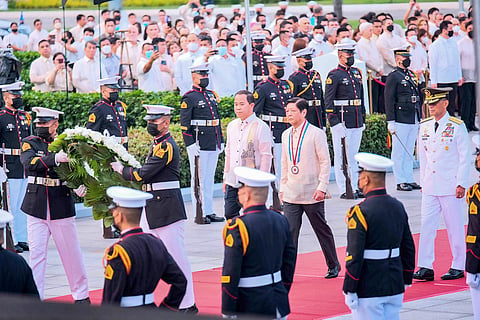
- NEWS
- the EDIT
- COMMENTARY
- BUSINESS
- LIFE
- SHOW
- ACTION
- GLOBAL GOALS
- SNAPS
- DYARYO TIRADA
- MORE

President Ferdinand "Bongbong" Marcos Jr. and the First Family led the country in honoring the life of Dr. Jose Rizal — the country's national hero — in a solemn ceremony on Friday morning.
At the Rizal Park in Manila, Marcos paid homage to Rizal on his 126th death anniversary and offered a wreath at the Rizal National Monument following the flag-raising ceremony.
Presidential sons Ilocos Norte Rep. Sandro Marcos, Simon, and Vincent raised the Philippine flag at Rizal's monument when the ceremony commenced.
In his message, the Philippine leader recognized Rizal's sacrifices that allowed Filipinos to be enlightened about the injustices, corruption, and oppression being done by its colonizers.
"He did this unflinchingly, not through a violent uprising, but through a peaceful protest using the power of the pen," he said.
Marcos said Rizal's martyrdom can make Filipinos "reflect on the kind of life" they want to live.
"After all, true heroism does not only mean offering your life for your country but also fighting your own silent battles and working within your capacities to bring about a better future we want to see for the present and succeeding generations," he said.
The Chief Executive also called on the public to embody the national hero's patriotism as they confront the "social ills that may threaten our liberty" and contribute to nation-building.
"As we cap this year by honoring the legacy that Rizal has left for our country, may we continue to embody the virtues of excellence, patriotism, and perseverance that he exhibited throughout his life," he said.
May Rizal continue to be a role model for Filipinos, Marcos said, as he encouraged them to impart their knowledge and skills "to the betterment of society."
Rizal, who was born in Calamba, Laguna on 16 June 1861, was executed by the Spanish colonial government at Bagumbayan field on 30 December 1896 after the Philippine Revolution erupted.
In 1898, then-President Emilio Aguinaldo declared 30 December as a day of national mourning to commemorate Rizal's death and all the casualties of the Spanish colonial rule in the country.
The Philippine Commission enacted a law to officially declare 30 December as Rizal Day in 1902.
